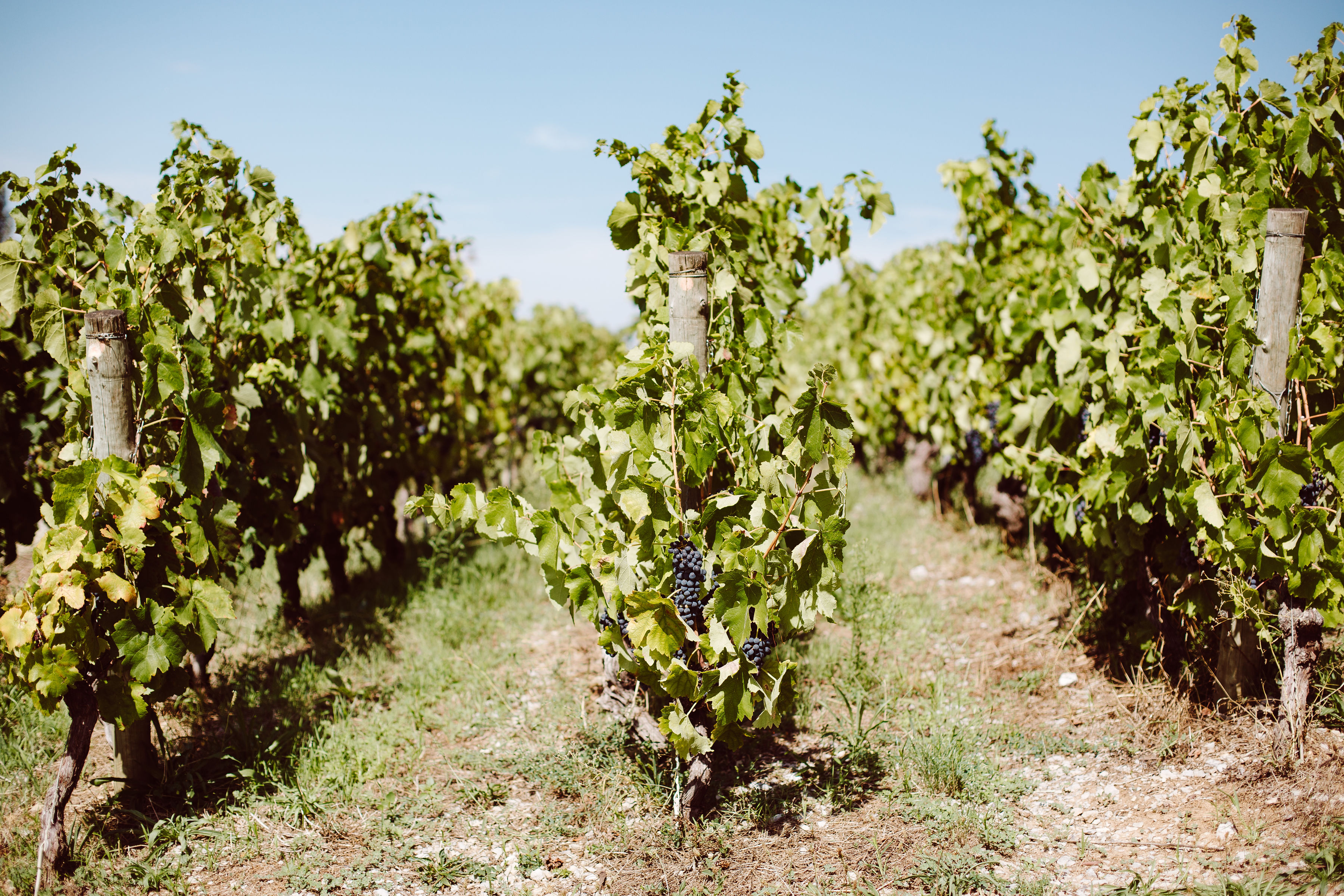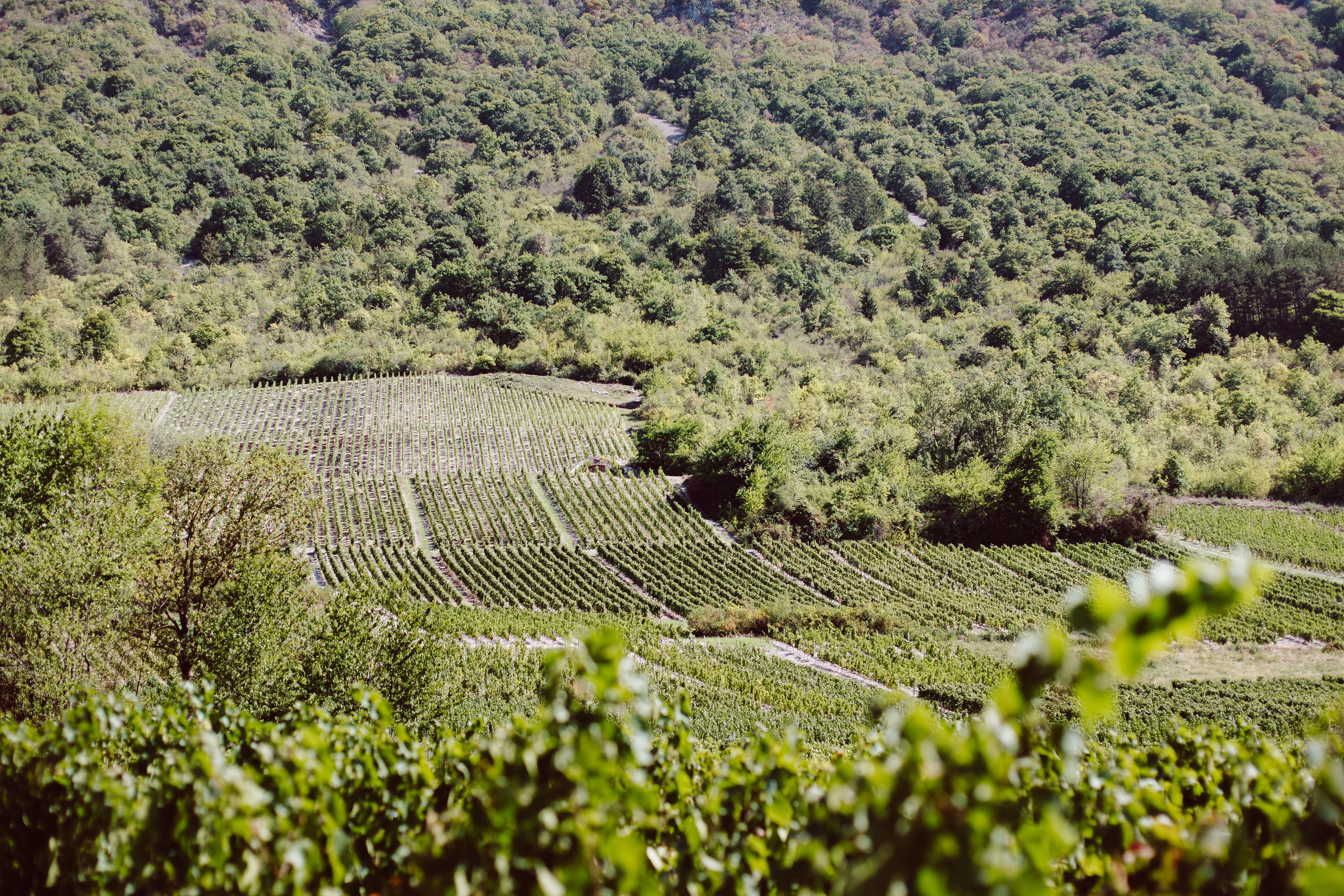
Languedoc
The Languedoc, a contrasting vineyard between the mountains and the Mediterranean
It is both the largest and the oldest vineyard in France. The Languedoc-Roussillon vineyard covers some 240,000 hectares and its origins date back to the 5th century BC. In the Languedoc, 70,000 hectares of vines give rise to a wide range of appellations, the hierarchy of which is in the process of changing. The wine region, once known for its table and mass-produced wines, has undergone a major transformation over the last thirty years. The Languedoc wine offer is now structured with products that find, and prove, their identity and quality.
General presentation of the Languedoc vineyards
In the south of France, the Languedoc vineyards stretch between the Mediterranean Sea and the foothills of the Cévennes. It spreads from west to east between Carcassonne and Nîmes. It thus covers a large part of Occitania with a presence in the departments of Aude, Gard and Hérault.
Here, wine production is largely dominated by reds, at over 70%. The king grape varieties are Syrah, Grenache noir, Mourvèdre and Cinsault. As for the whites, Chardonnay is the leading variety. Many other grape varieties are grown in the Languedoc, as the region has sought to develop local grape varieties adapted to the climate.
The Languedoc vineyards are very extensive and offer a wide range of terroirs, between the sea and the mountains. This gives rise to wines that are very different from one another, available in three colours: red, white and rosé. The region also produces sparkling wines, including the Blanquette de Limoux.
The appellations
There are many different appellations, as the region has a great mosaic of terroirs. For the past thirty years, the Languedoc vineyards have been hierarchically classified in order to structure the production and make it easier to understand. In short, the wines are classified according to a pyramid structure: the generic Languedoc appellation forms the basis. This is followed by the AOC Grands Vins, the heart of the range, and the Crus, the summit of Languedoc wine production. There are also several IGPs.
AOC Languedoc
The wines grouped under this generic AOC constitute the entry level of the regional production. It replaces the appellation Coteaux du Languedoc. The AOC Languedoc is very extensive as it covers the whole of Languedoc-Roussillon, from the Spanish border to the gates of Nîmes. The wines are available in all three colours. The blends are mainly Grenache, Syrah, Mourvèdre, Carignan and Cinsault.
Great wines of the Languedoc
The vineyard produces several great AOC wines:
- AOC Cabardès: this appellation produced above Carcassonne uses grape varieties between the Atlantic (Cabernet, Merlot, Malbec) and the Mediterranean (Syrah, Grenache), for blends which are distinguished by their singularity.
- AOC Clairette du Languedoc: this white wine from the banks of the Hérault river uses exclusively the white clairette.
- AOC Corbières: produced from Carcassonne to Narbonne on steep, sunny slopes. The 1st AOC of the Languedoc region has a wide variety of whites, reds and rosés.
- AOC Faugères: north of Béziers, this AOC is made up of a third of organic wines.
- AOC Fitou: this is the oldest red wine AOC in the Languedoc, produced by the sea and in the Corbières mountains.
- AOC Limoux: in the west of the region, this AOC produces still red and white wines as well as sparkling wines (blanquette and crémant).
- AOC Malepère: to the west of Carcassonne, this appellation produces red and rosé wines, often mass-produced by cooperative cellars.
- AOC Minervois: this renowned appellation is located between Carcassonne and Narbonne and produces wines in all three colours.
- AOC Picpoul de Pinet: here, only one grape variety is used, the white Picpoule. It produces wines that are renowned for being the perfect accompaniment to the oysters of Bouzigues.
- AOC Saint-Chinian, AOC Saint-Chinian Berlou and AOC Saint-Chinian Roquebrun: to the north-west of Béziers, in the Haut Languedoc, this appellation and its two subdivisions produce red, white and rosé wines.
The Languedoc appellation also has several geographical denominations, spread out from Nîmes to Narbonne and passing through Montpellier and Béziers:
- AOC Languedoc - Cabrières
- AOC Languedoc - Grés de Montpellier
- AOC Languedoc - La Méjanelle
- AOC Languedoc - Montpeyroux
- AOC Languedoc - Pézenas
- AOC Languedoc - Quatourze
- AOC Languedoc - Saint-Christol
- AOC Languedoc - Saint-Drézéry
- AOC Languedoc - Saint-Georges-d'Orques
- AOC Languedoc - Saint-Saturnin
- AOC Languedoc - Sommières
Languedoc Crus
The top of the range of Languedoc wine production currently includes a few appellations that are constantly increasing their reputation:
- AOC Corbières-Boutenac: here the black carignan reigns for blended red wines.
- AOC La Clape: just outside Narbonne, in the Aude, this AOC produces white and red wines.
- AOC Minervois-La Livinière: on an arid territory, mainly syrah, mourvèdre and grenache are grown.
- AOC Pic-Saint-Loup: between the Mediterranean and the Cévennes, north of Montpellier, this appellation produces wines renowned for their finesse, especially reds made from syrah, grenache and mourvèdre, as well as rosé wines.
- AOC Terrasses du Larzac: a terroir characterised by its relief and its mix of grenache, mourvèdre, syrah, carignan and cinsault.
Appellations

Saint-Chinian PDO
Côteaux-du-Languedoc PDO
PGI Côtes de Thongue
PGI Pays d'Oc
IGP Hauterive
Languedoc la Clape PDO
Faugères PDO
IGP du Gard
Languedoc Pic Saint-Loup PDO
Cabardès PDO
Terrasses du Larzac PDO
PGI Côtes Catalanes
IGP Val de Montferrand
Corbières Boutenac PDO
Languedoc Pézenas AOP
Fitou PDO
IGP de l'Hérault
Corbières PDO
Languedoc PDO
Minervois PDO
Le vignoble
